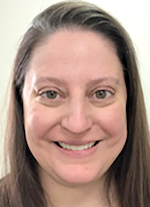Breadcrumb
NextGen Cardiovascular, Muscle & Metabolism Science Seminar – May 13, 2024
The goal of the NextGen Cardiovascular, Muscle & Metabolism Science Seminar is to highlight transdisciplinary precision research taking place in cardiovascular, muscle and metabolism fields; provide opportunities for collaboration among researchers to build their own research efforts; and promote clinical/researcher activity across the University of Missouri System and our partners.
For questions about this event, please reach out to Veronica Lemme lemmev@health.missouri.edu.
“Biomechanical Regulation of Vascular Development”
Speaker: Amber Stratman, Ph.D., Assistant Professor, Cell Biology & Physiology, Washington University School of Medicine in Saint Louis
Date: May 13, 2024, noon-1 p.m.
Location: Patient-Centered Care Learning Center, Room LC230
Description
This seminar will focus on the Stratman lab’s significant interest in understanding how sensing of forces — such as shear stress and multi-axial strain — by vessels alters their development and stabilization.
About the Speaker
Dr. Amber Stratman started as a tenure-track assistant professor in the Department of Cell Biology and  Physiology at Washington University School of Medicine in St. Louis in December 2018, following a Ph.D. in Medical Physiology from the University of Missouri in 2010 and a postdoctoral fellowship at the National Institutes of Health/National Institute of Child Health and Human Development and in developmental biology. Her lab focuses on understanding how biomechanical forces alter cellular level choices to build and maintain tissues in 3D spaces — in particular as it relates to blood vessel patterning and stabilization. Her group uses a multimodal approach, working both in tissue culture models and in the zebrafish, to elucidate molecular mechanisms that regulate vascular development. In tandem, the lab has established an in vivo genomics pipeline to study altered gene translation in response to changes in biomechanical force, netting information on new signaling networks to study in the context of mechanics and vascular patterning events.
Physiology at Washington University School of Medicine in St. Louis in December 2018, following a Ph.D. in Medical Physiology from the University of Missouri in 2010 and a postdoctoral fellowship at the National Institutes of Health/National Institute of Child Health and Human Development and in developmental biology. Her lab focuses on understanding how biomechanical forces alter cellular level choices to build and maintain tissues in 3D spaces — in particular as it relates to blood vessel patterning and stabilization. Her group uses a multimodal approach, working both in tissue culture models and in the zebrafish, to elucidate molecular mechanisms that regulate vascular development. In tandem, the lab has established an in vivo genomics pipeline to study altered gene translation in response to changes in biomechanical force, netting information on new signaling networks to study in the context of mechanics and vascular patterning events.